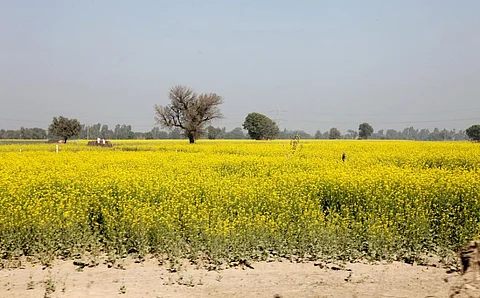

This was updated November 4, 2022 to reflect that the Supreme Court order granted the Union government till November 10 to respond to the petition and does not mention status quo; also adds response from another stakeholder to that
The Supreme Court (SC) November 3, 2022 granted time till November 10 to the Union government to respond to a petition challenging its decision giving the go-ahead to environmental clearance for genetically modified (GM) mustard. The court asked the Centre to put its response on record, along with an affidavit and additional documents.
“The petitioner may also file additional documents. We would request learned counsel for the parties to also file short notes on their proposed submissions before the matter is taken up next,” the SC bench said.
The Genetic Engineering Appraisal Committee (GEAC), a body of the Union Ministry of Environment, Forest and Climate Change, had recommended the environmental release of the seed for trials, demonstrations and seed productions in a meeting October 18.
Dhara Mustard Hybrid (DMH-11) is a hybrid seed variety that has stirred a storm between scientists, farmers and activists over its commercialisation. It is the first GM crop to be commercially released and grown by farmers in India.
The Coalition of GM Free India, an informal network of organisations and individuals campaigning and advocating to keep India GM-Free, had opposed the move of the Centre claiming it to be unscientific and alleged that no biosafety protocols were followed in the process.
Read
The Supreme Court already had pending cases on the matter of genetically modified organisms (GMO) in general and GM mustard in particular that the activists had filed as public interest litigations.
The anti-GM group knocked the doors of the Supreme Court. They requested the court on November 2 to list the matter for November 3, which the SC granted.
Kavitha Kurunganti, an activist who has been at the forefront of anti-GM protests, said the court verbally asked the Centre thrice to not go for further planting GM mustard and conducting its trials and demonstrations in India.
Kurungati said the group would continue to protest against the move made by the central government. “Government agencies have flouted laws at various levels including understanding the effect of GM mustard on honey bees and other pollinators and by passed biosafety protocols,” she said.
The Coalition of GM Free India has also alleged that no trials were conducted and that the GMO was also changed after the approval of the tests, making it a flawed process.
Deepak Pental, former vice chancellor of Delhi University who conceived GM mustard, alleged to Down To Earth, “The SC has issued a status quo that has put the development on hold. The apex court has always sided with the anti-GM lobby. However, a case will be made in the next hearing where the facts of the matter will be presented to convince the court that all protocols and tests have been followed with due diligence.”